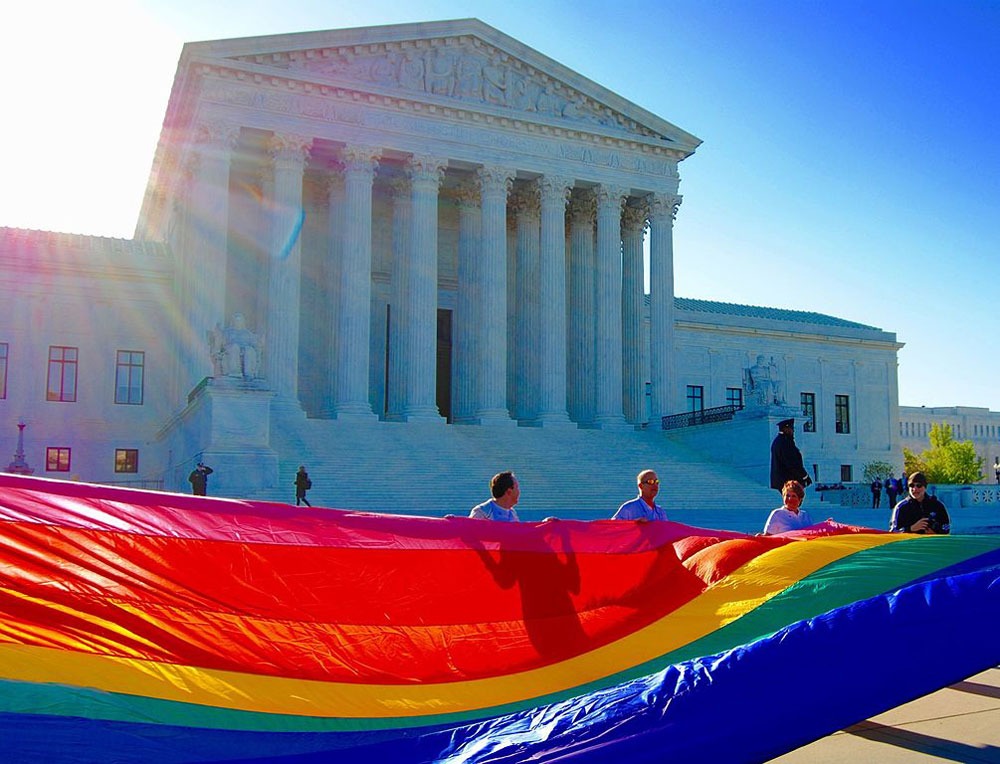
October 5, 2020; Slate
On October 5th, the US Supreme Court declined to take the case of Kim Davis, the clerk in Rowan County, Kentucky who refused “on God’s authority” to issue a marriage license to two men in 2015. Davis was sued and found guilty of violating their constitutional rights. She was now asking the Court to throw out that case, and the justices unanimously declined to do so. But this decision was not without its drama, and it served as a platform for justices Samuel Alito and Clarence Thomas to raise the issues of religious freedom and their challenge to the decision made in Obergefell (the 2015 decision that codified gay marriage).
Writing separately, Thomas and Alito strongly defended Davis, but not her particular case. In essence, they will need a “cleaner” one to raise the kind of religious challenge needed to overturn Obergefell. They call out the Court as branding those who believe that marriage is only between one man and one woman as bigots. They state that the Court has created a problem that only the Court can fix. This would seem to be a most direct call for the overturn of Obergefell, if only the right case would appear before the Supreme Court.
There will certainly be cases coming before the Supreme Court to grease the way for what Alito and Thomas are asking. On their docket this fall is a case, Fulton v. Philadelphia, in which the Court will decide if the First Amendment requires Philadelphia to fund foster care agencies that will not work with same-sex couples. There is no doubt where Alito and Thomas will stand in this case, and it is likely that, if confirmed, they would be joined by Amy Coney Barrett. If other conservative justices join in, does this case then lay the groundwork for anti-gay discrimination at the highest levels of jurisprudence?
And yet another case is also waiting in the wings. Mark Joseph Stern describes it this way: “Indiana has asked the court to uphold a law that discriminates against same-sex parents by refusing to place both of them on their child’s birth certificate. (Opposite-sex parents are placed on their child’s birth certificate even when they lack a biological connection.)” The Court struck down a virtually identical law in 2017, but Indiana is testing the waters to see if times have changed.
Sign up for our free newsletters
Subscribe to NPQ's newsletters to have our top stories delivered directly to your inbox.
By signing up, you agree to our privacy policy and terms of use, and to receive messages from NPQ and our partners.
There was, for a fleeting moment this June, the hope that the LGBTQ community had a new champion (or two) on the Supreme Court. Just in time for Pride Month, as NPQ wrote, in the case of Bostock v. Clayton County, Georgia, Justice Neil M. Gorsuch and Chief Justice John G. Roberts Jr. joined the court’s liberals in saying that Title VII of the Civil Rights Act of 1964, which prohibits discrimination “because of sex,” protects LGBTQ employees from dismissals. The other surprise in this ruling was that the majority opinion was written by Justice Gorsuch. As a disciple of Justice Antonin Scalia, a constitutional textualist, this case turned on the interpretation of the term “sex.” Justice Gorsuch was clear in his understanding of the text, saying,
Today, we must decide whether an employer can fire someone simply for being homosexual or transgender. The answer is clear. An employer who fires an individual for being homosexual or transgender fires that person for traits or actions it would not have questioned in members of a different sex. Sex plays a necessary and undisguisable role in the decision; exactly what Title VII forbids.
While he was joined by Roberts in this, as well as by the Court’s four liberal justices, the decision was met with furious dissent from the remaining conservative justices. It may not always be that the text will be with the LGBTQ community.
With changes in the makeup of the Court since Obergefell, and the open declarations of Thomas and Alito, it may not be long before these two justices are joined openly by others. The “right case” may soon come forward, putting the LGBTQ rights we now have once again at risk.—Carole Levine













